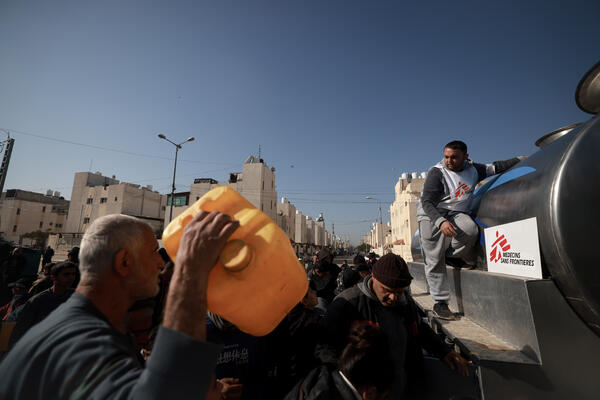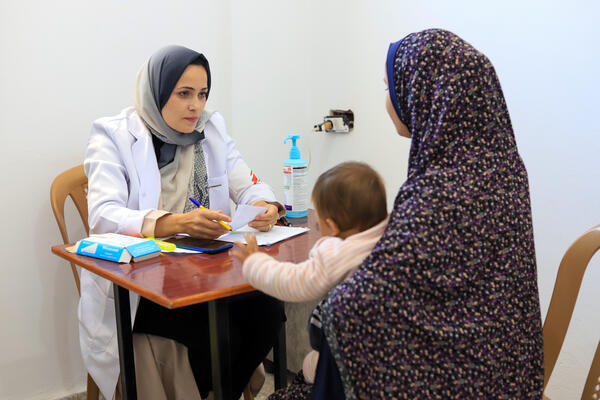Summary
Six months after the war between Israel and Hamas broke out in the Gaza Strip, Palestine, Médecins Sans Frontières (MSF) teams are responding as much as is possible to the enormous needs in the Strip. MSF teams are also responding in the West Bank, where access to healthcare has become increasingly difficult since the events of 7 October 2023.
MSF’s activities in Palestine before October 2023
MSF started working in Palestine and in the Gaza Strip in 1988, when we provided physiotherapy to people injured during the First Intifada (Dec 1987 – Sep 1993).
Gaza
Before October 2023, we worked to fill gaps in the healthcare system in Gaza, which was already overstretched, underfunded and deeply impacted by a 16-year blockade. Working in three hospitals and several outpatient clinics, we offered comprehensive care for people with burns and trauma; this included providing surgery, physiotherapy, psychological support, occupational therapy and health education. We also ran a reconstructive surgery programme in northern Gaza, which started in 2018. We worked in laboratories to identify and treat antibiotic-resistant infections, and provided training and psychological support for local healthcare workers. Following the breakout of war in the Gaza Strip in early October 2023, all of these activities have been suspended.
Context
Gaza
On 7 October 2023, Hamas, which has been in power in the Gaza Strip since 2007, launched a coordinated attack inside Israel, combining gunmen breaching security barriers and a barrage of rockets fired from Gaza. Hamas announced that its offensive was a response to the desecration of the Al-Aqsa Mosque and increased settler violence. As a result, around 1,200 people were killed, and more than 250 were taken captive.
That day, Israel started bombing Gaza. The following day, 8 October, Israel declared war on Hamas. Since then, Israeli forces have launched massive attacks on the Gaza Strip, with heavy bombing and violent raids on residential areas, schools, hospitals, health centres and ambulances, places of worship, media offices, and refugee camps. On 9 October, Israel announced a “total blockade” on Gaza, including a ban on water and food, and severely restricting the import of essential supplies, including medications and medical supplies. On 13 October, more than a million residents of northern Gaza received an evacuation notice from Israel to flee south within 24 hours.
Since then, Israeli forces have progressively moved south, ordering people to flee and hospitals to be evacuated, before systematically bombarding towns and neighbourhoods. They continue to bomb and attack neighbourhoods and districts; there is nowhere safe left in Gaza. Over 32,500 people have been killedi, including an estimated 13,000 children.ii Over 1.7 million people in Gaza, representing nearly 75 per cent of the population, are estimated to be forcibly displaced and living in unsafe, unhealthy conditions.
For nearly six months, people have had no food, water, shelter and little or no access to healthcare. Over 75,000 people have been injured; many have severe injuries that require complex, long-term treatment. Pregnant women are delivering their babies where they’re sheltering, or in facilities before being discharged only a couple of hours later – including those that have had caesarean sections. People are going hungry from the lack of food and becoming sick from drinking poor quality water.
Many healthcare centres and hospitals are no longer functioning, due to damage from shelling and incursions, a lack of fuel (needed to run generators for electricity), or both. Those that remain even partially functional are overwhelmed with patients and people, stretched to breaking point, with few staff – who are all exhausted – and almost no supplies. Hospitals and healthcare infrastructure and personnel have been repeatedly hit by strikes or bullets, despite our numerous pleas to respect medical care and workers. Since 7 October, five MSF staff have been killed in Gaza.

West Bank
Violence has surged across the West Bank in parallel to the Gaza war. Since 7 October, at least 400 Palestinians have been killed in clashes with Israeli soldiers and settlers. Israeli forces regularly raid Palestinian areas across the territory, including refugee camps. Since the beginning of 2024, 126 Palestinians have been killed in the West Bank, compared with 81 in the same period in 2023, the majority by Israeli forces. There has been a spike in attacks on healthcare, with WHO having so far documented over 400 attacks in the West Bank, including on ambulances.
People have been forcibly displaced, with over 100 houses demolished. Israeli forces have announced the West Bank as a closed area. Checkpoints remain closed and workers are not allowed to cross to Israel. Over 5,000 Gazans are internally displaced in the West Bank after their Israeli work permits were suspended and they were ordered to leave Israel. All of this is affecting the people’s access to basic services such as food, and medical services.
MSF response
Gaza
Our response in Gaza is comparatively limited, given our activities before the war and – more importantly – the massive needs there now are. Over the last six months, systematic sieges and evacuation orders on various hospitals have pushed our activities into an ever-smaller territory and are limiting our response.
Our teams are offering surgical support, wound care, physiotherapy, post-partum care, basic health care, vaccination, and mental health services.
MSF staff – internationally mobile and local staff – plus MSF-supported staffa are working/have worked in the following facilities since 7 October:
(Note: facilities marked with an asterisk [*] are those in which we are working under MSF management as at time of writingb; those in red are where there is no longer any MSF presence.)
Northern Gaza
• Al-Awda hospital - MSF staff and MSF-supported staff working autonomously, providing medical care.
• Al-Shifa hospital – evacuated November 2023; last MSF staff left in February 2024. Before evacuating, we had scaled up our response in the hospital by opening an operating theatre on 10 October.
• MSF clinic, Gaza City - MSF staff who have chosen to remain in Gaza City provide care for wounds whenever possible.
• Indonesian hospital – evacuated October 2023.
Middle Area
• Al-Aqsa hospital* - evacuated 6 January; staff returned 7 February. Palestinian and international staff provide orthopaedic and reconstructive surgery, advanced wound care, post-operative wound care, physiotherapy, health promotion and mental health support.
• Al-Martyrs clinic* - staff provide wound care and malnutrition screening.
Southern Gaza
• Nasser hospital, Khan Younis – evacuated; last MSF staff left 15 February. We provided emergency care and surgical treatment, including for burns patients.
• European Gaza Hospital, Khan Younis – no MSF staff. Activities stopped in March due to insecurity. We provided surgical services and changing dressings of wounds.
• Rafah Indonesian Field hospital* - we provide post-operative care to war-wounded patients, including dressing changes, physiotherapy, and counselling.
• Al-Najar Hospital - activities ended. We provided surgical and wound care, ending our activities at the end of March.
• El-Emirati Maternity hospital, Rafah* - our Palestinian and international staff provide postpartum care and manage complications in pregnancies.
• Al-Shaboura clinic, Rafah*- a Palestinian and international MSF team is providing general consultations, vaccination, reproductive health services, wound dressing changes, and individual and group mental health services. We also screen children under 5 and pregnant and lactating women for malnutrition.
• Al-Mawasi health posts x 2, Rafah* - we work in two health posts in Al-Mawasi, where we provide general consultations, ante-natal and post-natal care, mental health, physiotherapy, wound dressing changes, vaccination, and malnutrition screening for children under five, and pregnant and lactating women.
• Beni Suhaila clinic - we provided basic health care, wound dressing, and mental health consultations, until Israeli forces ordered people to evacuate the area on 1 December.
• Water and sanitation – MSF teams distribute clean water across nearly a dozen locations in Rafah
Response in figures
Please note – figures are not exhaustive
240,000 – litres of clean water per day being distributed by MSF teams
74,300+ - number of medical consultations (not a complete/extensive figure; reporting could not be provided for the first three months of the war)
100 – tons of medical supplies, mainly surgical and dressing kits, sent into Gaza in five deliveries.
a MSF-supported staff refers to daily workers whose salaries are paid by MSF, but who are not MSF employees. These staff do not work under MSF management.
b In hospitals like Al-Awda, MSF employees are working autonomously, but without MSF management.
West Bank
Since October 2023, access to medical care in the West Bank has been severely disrupted at times in some places. In response, we have expanded our activities. We maintain our operations focused providing emergency care, basic healthcare via mobile clinics, and mental health care in Hebron, Nablus and Jenin.
Hebron
We provide medical care through 10 mobile clinics in areas outside and inside Hebron’s Old City, and in the remote villages of Masafer Yatta in the Southern West Bank. We provide support to four clinics, and provide personnel support to increase the capacity of the maternity ward and emergency room in Halhoul hospital. We provide extra capacity in the emergency room at Al-Moktaseb hospital and provide mental health services. We also make donations to various hospitals and provide first-aid kits to community focal points in Beit Omar, Al-Rshaydeh, and to the emergency care centre in Um El Khair. We train medical staff in Al-Moktaseb hospital, Hal-Hul, Dura, and Yatta hospital in the wider Hebron area.
In response to the situation since 7 October, we’ve increased health promotion activities and the distribution of relief items, hygiene kits and food parcels to internally displaced Gazans, and West Bank residents affected by violence and forcible displacement.
Nablus
We continue to offer individual and group mental health sessions, as well as psychiatric consultations in Nablus, Qalqiliya and Tubas.
Jenin and Tulkarem
Our medical staff provide extra capacity in the emergency rooms at the Ministry of Health hospitals in Jenin (Khalil Suleiman hospital) and Tulkarem (Thabet Thabet hospital) governorates. We equip volunteer paramedics in Jenin, Tulkarem and Nur Shams refugee camps with donations and training, so they can stabilize patients during active hostilities. In December, we established stabilization points in existing health facilities and are training staff in trauma care. In both governorates, we run activities to strengthen the existing mental health care services and support Gazan workers stranded in the West Bank since 7 October.
Egypt
We have a rear base in Egypt to facilitate the transit of our internationally mobile teams and supplies. Our teams in Egypt are ready to send more medical supplies into Gaza if allowed to safely do so. We are in contact with the Egyptian authorities and relevant organisations in Egypt to start activities in Egypt to provide healthcare for injured or sick Palestinian people allowed to exit Gaza, if needed as well.

Expenditure/budget
€24.57 million – Oct-Dec 2023 only. Expenditure for 2024 so far is not yet available.
2024 operating budget – €24.52 million (subject to change depending on needs and access).
i According to Ministry of Health, Gaza.
ii According to UNICEF.
iii According to OCHA.
iv According to WHO.


